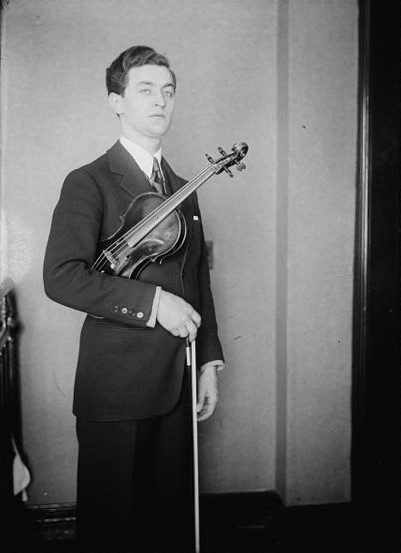by Jarrett Hoffman

•Tonight: the Perry & Hana duo (saxophone and piano) and a holiday concert by the Rodney Marsalis Philadelphia Big Brass
•Almanac: violinist Samuel Dushkin — what he played, and what he didn’t play (not by his own choosing)
HAPPENING TODAY:
Music for saxophone and piano is on the menu at 7:00 pm, when Perry & Hana — Perry Roth and Hana Chu — present a duo program at Church of the Western Reserve in Cleveland. A freewill offering will be taken up.
And at 7:30, the Rodney Marsalis Philadelphia Big Brass will bring a holiday program of swing, classical music, and New Orleans jazz to E.J. Thomas Hall in Akron. The concert is part of the Tuesday Musical series. Read a preview article here, and get tickets here.
TODAY’S ALMANAC:

That began with the premiere of Stravinsky’s Violin Concerto — the composer’s first work for violin — and continued with several works for violin and piano. The Duo Concertante and Divertimento were both written by Stravinsky to play with Dushkin on tour, while the Suite Italienne — a transcription from the composer’s ballet Pulcinella — was made in collaboration with the violinist.
Click here to listen to a 1935 recording of the Concerto as performed by Dushkin and the Lamoureux Orchestra, led by Stravinsky himself.
Dushkin is also known to history for his involvement in a work he did not premiere — and not by his own choosing. That would be William Schuman’s Violin Concerto, which the violinist commissioned with the idea of premiering it with Serge Koussevitzky and the Boston Symphony. Only, at this point in Dushkin’s career, it seems that his playing had seen better days, something that Schuman discovered after meeting with Dushkin in late 1947 to hear him play. By that point, the concerto was already written.
“I will play, but not with Dushkin,” Koussevitzky would go on to tell Schuman — adding that it would be on the composer, of course, to pass this information along. “I don’t care what your agreement is.” (Dushkin had exclusive rights to the concerto for three years.) “Take it away from him. We’ll give it to Isaac Stern and play it with the Boston Symphony.”
After attending a concert together, Schuman and Dushkin sat down for drinks. As the composer later related in an interview, he broke the news like this:
Listen, Sam, this is the most difficult moment of my life in personal relationships, and it will be for you, too, but I can’t go on with the Violin Concerto. I know you were a great performer at one time, but no one is going to play it [with you], and this is what I have to tell you.
Dushkin’s response? He broke his cocktail glass in two. The experience was, in the eyes of Schuman,
Just terrible…it was one of the saddest things in my life. I still don’t know whether I was right or wrong.
(They do seem to have eventually put the past behind them after the death of Schuman’s parents.)
The three years of exclusivity passed, and in 1950, with Koussevitzky having stepped down at the BSO, Isaac Stern premiered the Concerto with the orchestra and new music director Charles Munch. Listen to that performance here.
What can only have added to Schuman’s angst over the whole situation is that he wasn’t entirely pleased with Stern’s interpretation — or with the piece itself. He went on to revise it twice, the final version being premiered in 1959 at Aspen Music Festival with violinist Roman Totenberg and conductor Izler Solomon — and the composer was finally satisfied.



